We Tested Wix vs Squarespace vs WordPress: Our Overall Winner in 2024
If you click to purchase a product or service based on our independent recommendations and impartial reviews, we may receive a commission. Learn more
Wix, Squarespace, and WordPress are some of the biggest website builders to compare. But which platform is the best when we review them side-by-side? Following our 2024 research, Wix is the best website builder overall. It offers unbeatable features, including automated marketing tools and memberships, making it ideal for businesses looking to get online.
Squarespace is another strong option with its easy-to-use editor and stylish designs, while WordPress caters more to users looking to share and publish a high volume of content.
| Wix is best for... | Squarespace is best for... | WordPress is best for... |
|---|---|---|
| Businesses looking to get online easily and quickly. Wix’s drag-and-drop editor, robust product backend, and impressive suite of built-in features make it easy to grow your website over time. | Creatives or service-based websites that want to build an online portfolio, showcase their work, or take online appointments for classes and services. | Content-heavy sites and experienced builders. You’ll need to manage and organize things like web hosting and security yourself, but you are granted a high degree of control over your site. |
Wix vs Squarespace vs WordPress: Quick Comparison
Short on time? Get a quick overview of the three platforms from the table below:
 |  |  |
| Wix | Squarespace | WordPress.org |
| Starting from | Starting from | Starting from $2.95 (for hosting) |
| Number of templates 900+ | Number of templates 150+ | Number of templates 10,000+ |
| Apps 500+ | Apps 40 | Apps 50,000+ |
To clarify, we’re talking about WordPress.org in this review – a Content Management System (CMS) that gives users total control over building and managing a site, from designing pages to choosing a web hosting provider. This is different from WordPress.com, a more traditional website builder like Wix or Squarespace.
If you still can’t decide between Wix, Squarespace, and WordPress, try our four-question quiz to get a personalized website builder recommendation based on your needs.
How Much Does Each Builder Cost?
Of the three platforms, Squarespace is the best value for money. With three plans to choose from, Squarespace’s pricing ranges from $16 to $52 per month (billed annually). Its cheapest plan, Personal, is best for simple personal sites or portfolios, but you’ll need to upgrade to the $23 per month Business plan or above if you want to sell online.
You can try the builder out for yourself with Squarespace’s 14-day free trial and use the code “WBE10” for 10% off your chosen plan.
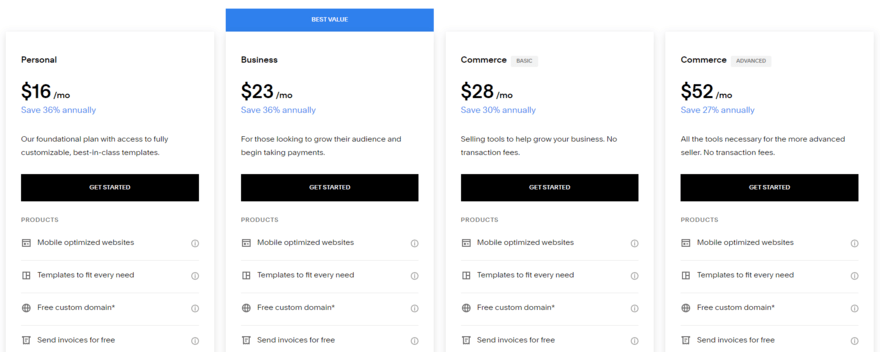
Wix’s pricing ranges from $17 to $159 per month (billed annually). Like Squarespace, you’ll need to upgrade from the cheapest option and choose the Core plan or above if you’re looking to build an online store.
Get 10% off your Wix plan with the code “TAKE10”.
Wix also has a free plan that you can stay on for as long as you’d like, but it does come with limited features, like minimal 500MB storage space and ads on your website’s pages. To remove these ads, you’ll need to upgrade to one of four premium plans.
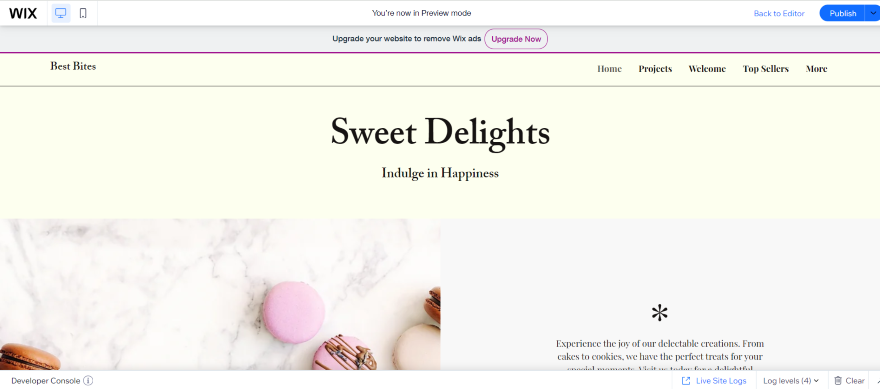
Every builder comes with additional costs to consider, such as Squarespace’s Acuity Scheduling tool which starts from $16 per month, or Wix’s Email Marketing package where you can pay to unlock more monthly emails.
WordPress itself is free to use, but we recommend treading carefully – you’ll need to pay for hosting, templates, and plugins, too! All of this is included in Wix and Squarespace’s plans.
You can set your own monthly pricing depending on the hosting provider and any add-ons you decide to install. We recommend choosing Bluehost as your web host – prices for WordPress hosting start from $2.95 per month and include a custom domain for the first year and security benefits. One less thing to worry about!
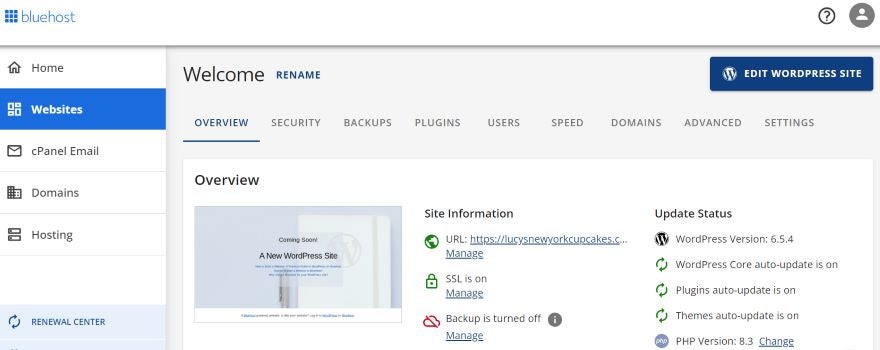
If you’re happy to hunt around for good deals and enjoy having full control over every aspect of your budget, then WordPress can be a lot cheaper than Wix and Squarespace. That said, WordPress pricing can vary greatly depending on the site, whereas Wix and Squarespace offer more structure with their pricing plans.
1. Wix: Best for Small Business
- Wix Pricing: Free – $159 per month
- Read our Wix Review for a detailed look at the website builder
Wix has been our best website builder for nine years in a row, scoring an almost flawless 4.9 out of 5 rating in our 2024 research. It offers unmatched website features, such as personalized SEO and built-in email marketing tools, on top of high-quality designs and ecommerce functionality. Because of this, we recommend the website builder for small businesses looking to get online and grow their audience.
Our Experience With Wix
When testing Wix ourselves, we used the newly released AI chatbot to help create a custom website for us. It asked a few basic questions about goals and the target audience, all the while generating a tailored site plan based on our responses. For example, we said we wanted to build an online store to sell house plants and Wix’s AI chatbot created a catchy tagline and suggested the tone of voice should be “straightforward and nature-loving”.
The whole onboarding process takes about a minute from conversation to website creation, and we could easily customize the AI creation using Wix’s user-friendly drag-and-drop editor.
Wix’s AI chatbot is a particularly useful building tool for small businesses short on time or for individuals who lack technical confidence when it comes to these types of tasks.
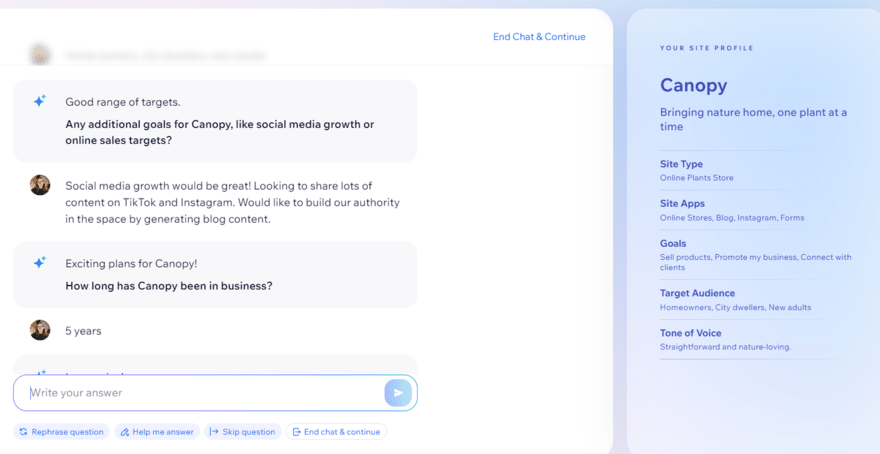
Wix offers the best website features on the market, including website analytics and a full marketing suite. These are great for small businesses within any industry,
We were impressed by how much we could customize the email marketing templates, allowing us to tailor the format and style to match our brand. And, SEO is incredibly important for businesses launching themselves online, so Wix’s personalized SEO checklist is a great tool to help businesses boost visibility online and gain more traffic.
That said, Wix’s suite of built-in features and additional options in the app store can be overwhelming for some users. Your website might not need to offer appointments or take online orders, but these features are automatically included with your plan. In comparison, with WordPress, you can build your website from the ground up and only add what your site needs.
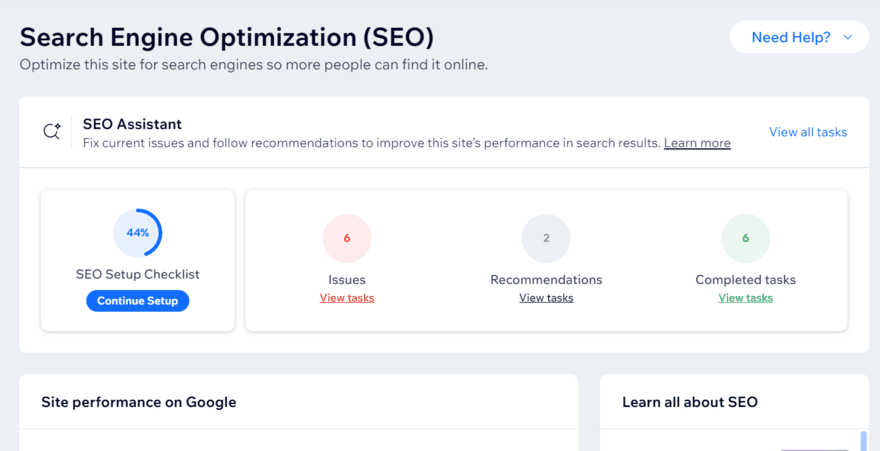
Of the three platforms, Wix is the better option if you’re looking to set up an online store. While it doesn’t have the same scalability and impressive suite of features as Shopify, our top-rated ecommerce website builder, Wix does offer a lot of built-in ecommerce features, too. For example, all Wix stores, from the $29 per month plan or above, get abandoned cart recovery and the ability to add discounts during checkout.
However, you’ll need to upgrade to $36 per month Business plan to automatically apply sales tax, unlock advanced shipping tools, and sell in multiple currencies.
The Winner
Wix is our top-rated website builder for 2024
2. Squarespace: Best for Creatives
- Squarespace Pricing: $16 – $52 per month
- Read our Squarespace Review for a detailed look at the website builder
Squarespace is the easiest website builder we’ve tested and the best value for money. Because of Squarespace’s stunning templates and intuitive interface, we recommend it to both beginners and designers alike. It’s also a smart choice if you’re looking to build a creative or service-based website because of its design options and built-in tools.
Our Experience With Squarespace
To get started with Squarespace, we were presented with two options: use an AI-guided web design system called Squarespace Blueprint, or choose from over 150 Squarespace templates.
If you want to build an artist website or create an online portfolio, we recommend choosing a template to get started. There’s greater variety and you can filter the catalog by industry – we particularly love the “Novo” template if you’re looking to showcase your work. Unfortunately, Squarespace Blueprint, while easy and quick to set up, generates fairly uninspiring results.
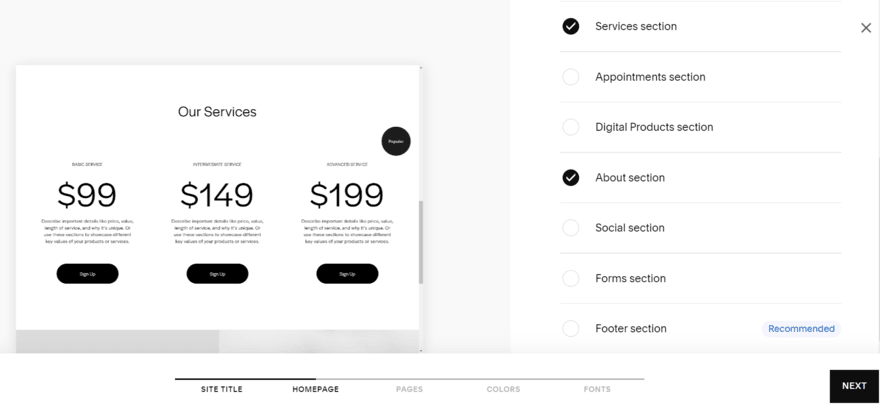
Once in the editor, we had no trouble moving elements or sections around with Squarespace’s drag-and-drop editor. While this is similar to Wix, Squarespace provides an added structure with a grid overlay which helps you align elements with ease.
Squarespace continues to give you creative control as you build. Just like its broad range of templates at the start, we found we could choose from almost 20 pre-designed section types in the editor, all with multiple styles available. For creatives, portfolios, and online stores, there are plenty of options, such as “Services” and “Testimonials”. We love adding the “Forms” element because you can tweak the styling, layout, and form questions in just a few clicks.
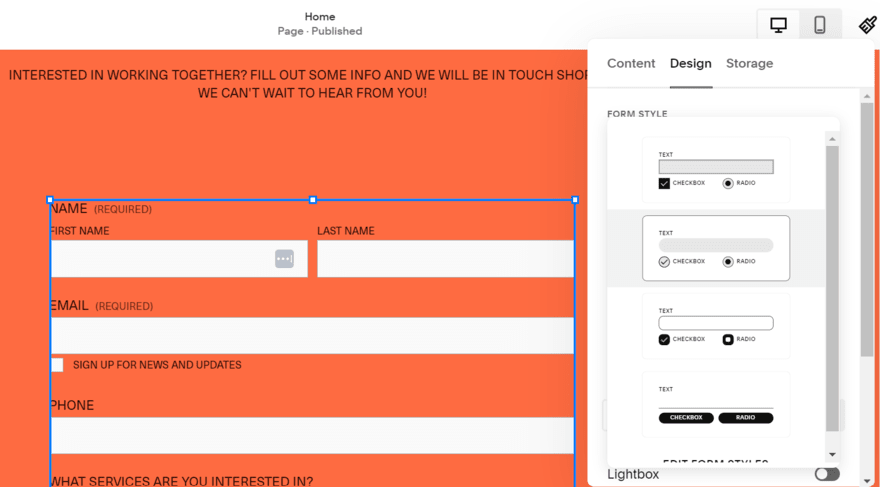
Squarespace offers a lot of useful features as well but be warned that some come with an additional fee. For example, low-stock alerts help online stores drive sales and create a sense of urgency, and the tool is completely free. Squarespace’s $16 per month – this is an additional fee on top of your regular Squarespace plan.
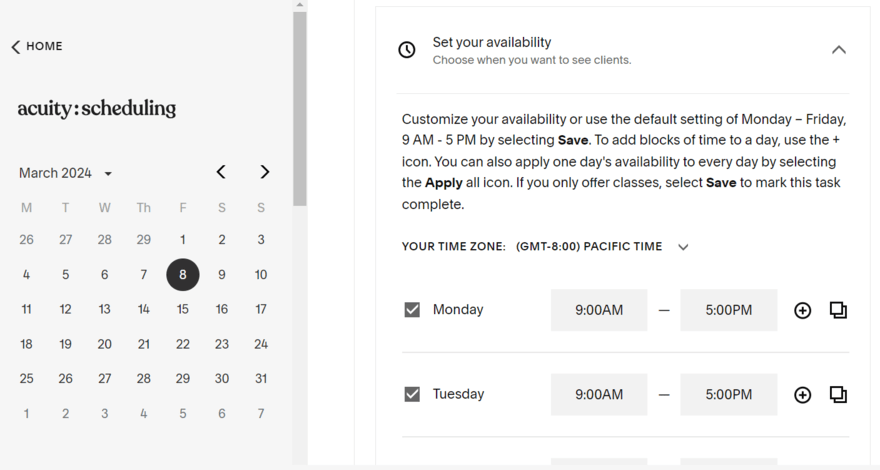
3. WordPress: Best for Content-Heavy Sites
- WordPress Pricing: Free – with additional costs for hosting, domain names, and more
- Read our WordPress.org Review for a detailed look at the CMS platform
WordPress isn’t as beginner-friendly as Wix or Squarespace, but it’s trusted by large companies, such as NASA and Rolling Stone. Because of its nature as a CMS, rather than a website builder with everything built-in, users have to be more self-sufficient.
You’ll need to source and manage your own web hosting, security, and overall website maintenance. So, it’s not for the faint of heart. However, because of its blogging tools and large plugin library, we recommend WordPress for individuals looking to create a content-heavy website.
Our Experience With WordPress
Unlike Wix and Squarespace, you’ll need to download and install WordPress before you can start using the platform. But, before your site can go live, you’ll need to organize a hosting provider for your site. We recommend Bluehost since it has close ties with WordPress already, offering automatic WordPress updates, and its plans start from $2.95 per month.
Coding knowledge or prior website-building experience will be useful if you choose WordPress since the editing process will be more intensive than traditional website builders. There’s no built-in drag-and-drop editor and you can’t browse a library of pre-designed elements to simply place on your site’s pages. Instead, you can edit code or control content in the backend settings. Because of this, we don’t recommend WordPress for beginners – Squarespace is much easier to use and will help you get online without a headache.
That being said, there are alternative design options with WordPress. You can use the Gutenberg editor for starters – this is the best route for anyone less tech-savvy. The block-style editor lets you stack basic elements on your pages, such as galleries and your latest blog posts.
Alternatively, you can rely on plugins to simplify the building process overall – we recommend checking out the Elementor plugin if you want to stick to a drag-and-drop editing experience.
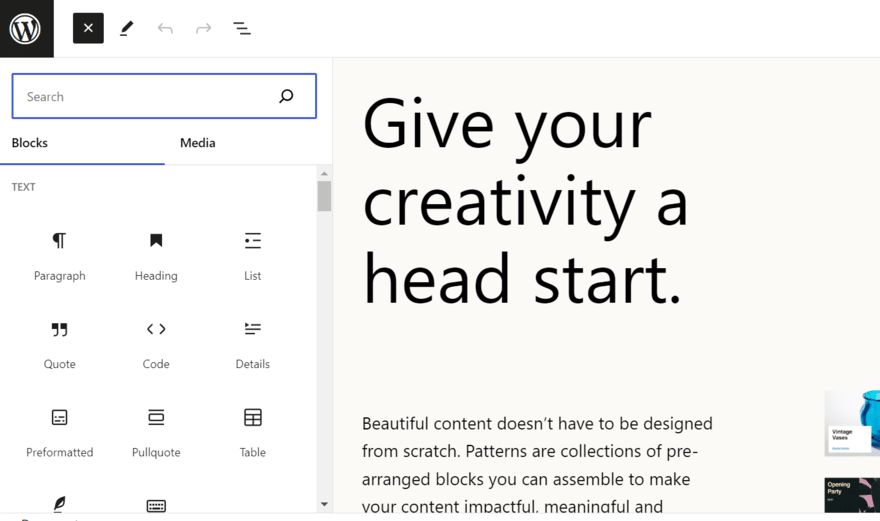
You can expect basic built-in features with WordPress, such as comments management and a suite of publishing tools so you can schedule and revise blog posts at your leisure. This makes WordPress ideal for anyone looking to simply share content online, as opposed to setting up an online store or visual portfolio.
Because of its nature as an open-source platform, you’ll need to explore WordPress’ library of over 50,000 plugins if you want added functionality. For example, you can install Jetpack for a boost to your site’s security and speed, or Yoast SEO to help optimize your content effectively.
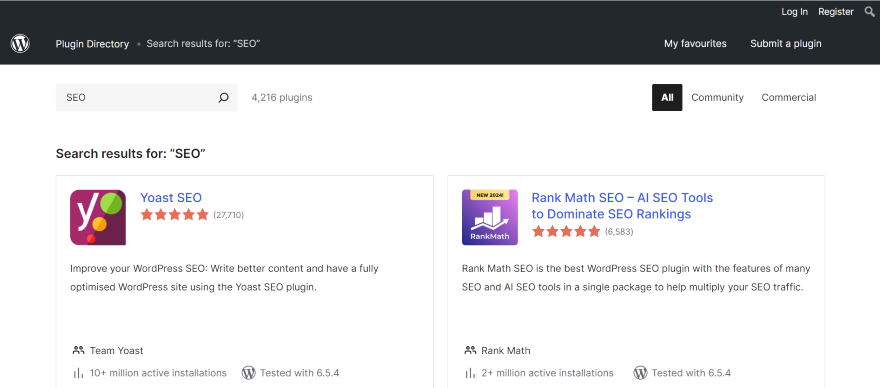
You have complete freedom when it comes to building a site from scratch – you choose what to install and add. Your site caters to your needs alone, making it unique in every way. With Wix, for example, customers share the same resources, like themes, design options, and SEO tools.
You can add as many or as few plugins as you need to your WordPress site, but we don’t recommend installing everything you see – make sure to check the reviews, ratings, and compatibility first. Downloading plugins does come with risks, such as vulnerability to malicious attacks. In July 2023, over 200,000 WordPress accounts were put at risk after hackers exploited a weak plugin.
If you’re looking for an easier alternative, consider Wix or Squarespace. You could even try WordPress.com which offers more guidance and structure when creating a website from scratch. WordPress.com’s plans range from free to $45 per month (billed annually).
How We Test Website Builders
In 2024, we’ve rigorously tested 16 leading website builders using our research process to bring you up-to-date recommendations. This helps us accurately and fairly compare Wix, Squarespace, and WordPress.
We’ve conducted over 200 hours of data collection to determine which builder comes out on top and to help you find the right fit for your business. Our testing encompasses six core categories, such as website features and user experience, and covers 398 areas of investigation in total. From this, we get unique insights and ratings to share with our readers.
Wix vs Squarespace vs WordPress: Which Is the Winner?
We’ve carried out a deep dive into Wix, Squarespace, and WordPress, but which is our overall winner? Wix is the best website builder we’ve tested, offering top website features and beautiful templates for a wide range of industries. Our detailed sections should help you decide which platform is the right choice for you, but to recap our recommendations once more:
- Wix is best for small businesses looking to get started online or grow their online reach using Wix’s impressive range of built-in tools and SEO support
- Squarespace is more suitable for creatives or service-based businesses because of its stunning templates and elements, as well as its built-in tools for building engagement with clients and scheduling services
- WordPress is a great option for content-heavy sites thanks to its suite of publishing tools, but we don’t recommend it for beginners due to the complex editor and lack of built-in features
Want even more options? Read our guide to the best website builders to compare the other top platforms on the market.
8 comments